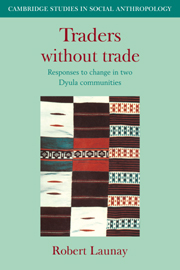Book contents
- Frontmatter
- Contents
- List of figures, maps and tables
- Preface
- 1 Introduction: the people and the problem
- PART I THE LEGACY OF THE PAST
- PART II RESPONSES TO CHANGE
- 6 The seeds of change
- 7 Occupation, migration and education
- 8 Being Dyula in the twentieth century
- 9 Dyula Islam: the new orthodoxy
- 10 Kinship in a changing world
- 11 Conclusions: Heraclitus' paradox
- Notes
- Bibliography
- Index
- Cambridge Studies in Social Anthropology
7 - Occupation, migration and education
Published online by Cambridge University Press: 15 October 2009
- Frontmatter
- Contents
- List of figures, maps and tables
- Preface
- 1 Introduction: the people and the problem
- PART I THE LEGACY OF THE PAST
- PART II RESPONSES TO CHANGE
- 6 The seeds of change
- 7 Occupation, migration and education
- 8 Being Dyula in the twentieth century
- 9 Dyula Islam: the new orthodoxy
- 10 Kinship in a changing world
- 11 Conclusions: Heraclitus' paradox
- Notes
- Bibliography
- Index
- Cambridge Studies in Social Anthropology
Summary
Rapid economic change, especially since World War II, has afflicted both the Dyula of Koko and those of neighboring villages such as Kadioha. The collapse in the value of hand-woven cloth, which led to their loss of the traditional monopoly over local trade, has had bitter consequences for a people whose very name means ‘trader’. Precisely because their daily bread has always depended on what they could earn in the market, if not the marketplace, they have had no choice but to face the situation as squarely as possible. Unlike their neighbors, the Senufo subsistence farmers, who can always fall back on what they produce in order to eat, the Dyula are virtually married to the international, national and local markets for goods and services. In principle, of course, Dyula villagers, and even some townsmen, could always turn to tilling the soil for their own food; but whenever and however possible, most would prefer to avoid this last – and unpalatable – resort.
In the search for a viable way of earning a living, the Dyula of Koko have one distinct advantage over their relatives in the surrounding villages. A market for a whole range of goods and services exists, if not at their very doorstep, only a short way ‘across the stream’. Of course, they can no longer expect to enjoy any sort of monopoly over whatever they may have to offer; each new immigrant to the town is as likely to be a competitor as a customer.
- Type
- Chapter
- Information
- Traders Without TradeResponses to Change in Two Dyula Communities, pp. 90 - 105Publisher: Cambridge University PressPrint publication year: 1982



